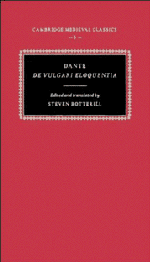Book II
Published online by Cambridge University Press: 16 October 2009
Summary
Once more I call upon the resources of my swift-moving intellect, take up once more the pen used in my fruitful labours, and first of all declare that the illustrious Italian vernacular may as fittingly be used for writing prose as for writing poetry. But, because writers of prose most often learn the vernacular from poets, and because what is set out in poetry serves as a model for those who write prose, and not the other way about – which would seem to confer a certain primacy – I shall first expound the principles according to which the illustrious vernacular is used for writing poetry, following the order of treatment laid down at the end of the first book.
Let us first ask, then, whether all who write poetry in the vernacular should use it in its illustrious form. To a superficial enquirer it might seem that they should, because anyone who writes poetry should embellish his lines as much as possible; and therefore, since nothing provides as splendid an ornament as does the illustrious vernacular, it seems that any writer of poetry should use it. Moreover, anything that is the best of its kind, if it be mixed with what is inferior to it, not only takes nothing away from the lesser material, but actually improves it; and therefore if poets, however crude the verses they write, mix the illustrious vernacular with their own crudities, they not only do the right thing but, it seems, are obliged to do so: those of limited ability stand much more in need of help than those with greater skill.
- Type
- Chapter
- Information
- Dante: De vulgari eloquentia , pp. 46 - 89Publisher: Cambridge University PressPrint publication year: 1996

